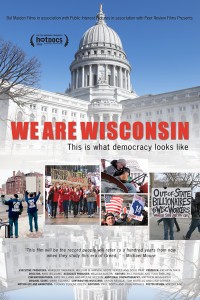 Director/Camera: Amie Williams. Producer: Kathryn Takis. Executive Producers: Marge Tabankin, Doug Pray, Bill W. Hirsch, Scott Verges. Additional Camera: Arlene Nelson. Editors: Bill Haugse, Todd Darling. Original Score: Mark Tschanz. Music: Liam Gerber, Tom Morello, Aaron Nevi. Presented by Bal Maiden Films, Public Interest Pictures, and Peer Review Films. 105 minutes. $19.95 (DVD). Official Website: WeAreWisconsinTheFilm.com. [Note: the official website listed here no longer provides information about the film, but as of September 2020 we have updated the link to a site that does provide information.]
Director/Camera: Amie Williams. Producer: Kathryn Takis. Executive Producers: Marge Tabankin, Doug Pray, Bill W. Hirsch, Scott Verges. Additional Camera: Arlene Nelson. Editors: Bill Haugse, Todd Darling. Original Score: Mark Tschanz. Music: Liam Gerber, Tom Morello, Aaron Nevi. Presented by Bal Maiden Films, Public Interest Pictures, and Peer Review Films. 105 minutes. $19.95 (DVD). Official Website: WeAreWisconsinTheFilm.com. [Note: the official website listed here no longer provides information about the film, but as of September 2020 we have updated the link to a site that does provide information.]
During the outstanding 2013 conference of the Regional Orchestra Players’ Association (ROPA), delegates and attendees were treated to a showing of the documentary We Are Wisconsin, which tells the story of the 26-day occupation of the Wisconsin State House as public workers from many different occupations came together to protest Governor Scott Walker’s efforts to eliminate collective bargaining rights and stifle the debate.
This film is inspiring and emotionally moving, as it tells the story of American workers from diverse walks of life coming together to find common ground in a universal cause. These are people who may not have otherwise ever met were it not for these difficult circumstances, but they found strength, friendship, and unity through a shared idealism. As one of the participants in the protest says, “You need to pay attention because your rights can be gone in a second with a stroke of a pen.”
Teachers, nurses, police officers, firefighters, and artists all joined together in the remarkable event, which was followed all over the world (as evinced by the pizza orders from multiple countries to feed the workers). Yet, somehow, in media that is often controlled by ideology, the true story was never shown on cable news, and the protesters were attacked as “thugs” by commentators. These “thugs” teach our nation’s children, protect our citizens and their homes, and selflessly tend to the sick. The citizens fighting for their rights were joined by musicians from AFM Local 166 (Madison) and Local 8 (Milwaukee). Throughout, music plays a central role in the protest, and in the human expressions on display.
While the occupation ultimately was not successful in its immediate mission, and the recall of Scott Walker failed, it is difficult not to see these citizens as heroes whose small victories will lead to an awakening of America’s workers for many election cycles to come—well, at least that is my hope. I have watched the film twice, and both times I had tears in my eyes, especially as the occupiers join together to sing the National Anthem. Certainly my emotions were born (at least momentarily) of anger and frustration over injustice, but ultimately what I felt was inspiration, admiration, and, most importantly, hope for an America that once again will care for the workers (teachers, artists, police officers, firefighters, nurses) that make our nation great.





